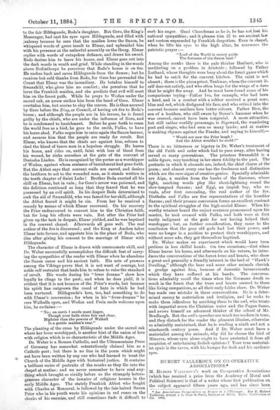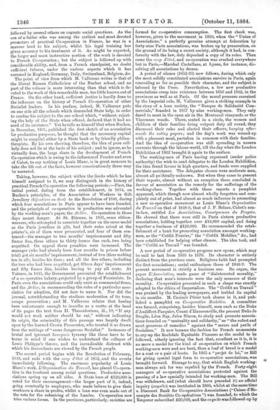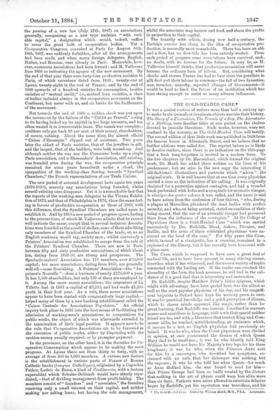HUBERT VALLEROUX ON CO-OPERATIVE ASSOCIATIONS*
M. HUBERT VALLEROUX'S work on Co-operative Associations (which has received a prize from the Academy of Moral and Political Sciences) is that of a writer whose first publication on the subject appeared fifteen years ago, and has since been Les Associations Co-opratives en France et d l'Etranger. Per P. Hilbert Valleroux, Avocat a In Cour de Peri., Docteur en Droit. Paris: Guillautnio et Cie. 1884.
followed by several others on cognate social questions. As the son of a father who was among the earliest and most devoted promoters of practical Co-operation in France, he was in a manner bred to his subject, whilst his legal training has given accuracy to his treatment of it. As might be expected, the larger and most instructive portion of the work is devoted to French Co-operation ; but the subject is followed up with considerable ability, and, from a French standpoint, no doubt sufficient fulness, under the various aspects which it has assumed in England, Germany, Italy, Switzerland, Belgium, &c.
The point of view from which M. Valleronx writes is that of the liberal Roman Catholicism of the Buchez school, and no part of the volume is more interesting than that which is de- voted to the work of this remarkable man, too little known out of France. On the other hand, sufficient justice is hardly done to the influence on the history of French Co-operation of other Socialist leaders. In his preface, indeed, M. Valleroux puts on one side all the schools which demanded State help, in order to confine his subject to the one school which, "without reject- ing the help of the State when offered, declared that it had no need of its existence." Yet he tells us himself that when Buchez, in December, 1831, published the first sketch of an association for productive purposes, he thought that the necessary capital might be supplied either by a State bank or by friendly philan- thropists. By his own showing, therefore, the idea of pure self- help does not lie at the basis of his subject ; and to ignore, as he virtually does, the large share in the development of French Co-operation which is owing to the influence of Fourier and even of Cabet, to say nothing of Louis Blanc, is in great measure to take the life out of the facts, however conscientiously these may be narrated.
Ta]ring, however, the subject within the limits which he has himself assigned to it, we may distinguish in the history of practical French Co-operation the following periods :—First, the initial period, dating from the establishment, in 1834, on Buchez's principles, of the Association of Workers in Gilt Jewellery (bijoutiers en clorg) to the Revolution of 1848, during which four associations in Paris appear to have been founded, and the principle of co-operation in production was advocated by the working-man's paper, the Atelier. Co-operation in those days meant danger. At St. Etienne, in 1841, some ribbon- weavers, who attempted to associate together on the same model as the Paris jewellers in gilt, had their rules seized at the printer's, six of them were prosecuted, and four of them sen- tenced—the manager to two months' imprisonment and fifty francs fine, three others to thirty francs fine each, two being acquitted. On appeal these penalties were increased. The manager (who had already been four months in prison before trial) got six months' imprisonment, instead of two (thus making ten in all), besides his fines ; and all the five others, including the two who had been acquitted, got fifteen days' imprisonment and fifty francs fine, besides having to pay all costs. At Valence, in 1845, the Government prevented the establishment of a co-operative bakery, projected by a group of Fourierists. In Paris even the associations could only exist as commercial firms, and the Atelier, in recommending the rules of a particular asso- ciation for adoption, did not dare to name it. Nor did the journal, notwithstanding the studious moderation of its tone, escape prosecution ; and M. Valleroux relates that having been unfortunate enough to inscribe as a motto at the head of its pages the text from II. Thessalonians, iii, 10, "If any would not work neither should he eat," without indicating its origin, the criminality of this passage was largely dwelt upon by the learned Crown Prosecutor, who treated it as drawn from the writings of" some dangerous Socialist." Instances of brutal and ignorant bourgeois tyranny like these have to be borne in mind if one wishes to understand the collapse of Louis Philippe's throne, and the ineradicable distrust with which his descendants are viewed by the French people.
The second period begins with the Revolution of February, 1848, and ends with the coup d'itat of 1852, and the events immediately following. The enormous popularity of Louis Blanc's work, L'Organisation du Travail, has placed Co-opera- tion in the forefront among social questions. Productive asso- ciations spring up on all sides. A State loan of 2120,000 is voted for their encouragement—the larger part of it, indeed, going eventually to employers, who made believe to give their workmen a share in profits, whilst a loan was even made out of the vote for the colonising of the Landes. Co-operation now tries various forms. In the provinces, particularly, societies are formed for co-operative consumption. The first check was, however, given to the movement in 1850, when the "Union of Associations," a perfectly genuine attempt at federation by forty-nine Paris associations, was broken up by prosecution, on the ground of its being a secret society, although it had, in con- formity with the law, duly deposited a copy of its rules. Then came the coup d'gtat, and co-operation was crushed everywhere but in Paris,—Marshal Castellane, at Lyons, for instance, dis- solving all associations by decree.
A period of silence (1852-63) now follows, during which only the most solidly constituted associations survive in Paris, again concealing as far as possible their character, and the subject is tabooed by the Press. Nevertheless, a few new productive associations creep into existence between 1856 and 1862, in the provinces as well as at Paris. Of the moral pressure exercised by the Imperial rule, M. Valleroux gives a striking example in the story of a loan society, the "Banque de Solidarite Com- merciale," founded in 1857 by nine working-men. They only dared to meet in the open air in the Montreuil vineyards or the Vincennes woods. There, seated in a circle, the women and children of their families doing outpost duty all round, they discussed their rules and elected their officers, burying after- wards the voting papers; and the day's work was wound-up with a pleasant meal, partaken in common with their families. And the idea of co-operation was still spreading in unseen currents through the labour-world, till the day when the London Exhibition of 1862 brought it again to the surface.
The working-men of Paris having expressed (under police authority) the wish to send delegates to the London Exhibition, the idea found favour in high quarters, and funds were supplied for their assistance. The delegates chosen were moderate men, almost all politically unknown. Bat when they came to present their reports, almost without an exception these concluded in favour of association as the remedy for the sufferings of the working-class. Together with these reports a pamphlet appeared, which though now almost wholly forgotten and com- pletely out of print, had almost as much influence in promoting a new co-operative movement as Louis Blanc's Organisation du Travail on that of 1848-9, that of J. P. Beluze, Cabet's son- in-law, entitled Les Associations, Consequences du Progres. He showed that there were still in Paris sixteen productive associations, holding together over 244,000 capital, and doing together a business of £128,000. He recommended the estab- lishment of a bank for promoting association amongst working- men, as the "Credit Foncier," the "Credit Mobilier," &c., had been established for helping other classes. The idea took, and. the "Credit an Travail" was founded.
A new period of co-operative progress now opens, which may be said to last from 1863 to 1870. Its character is entirely distinct from the previous ones. Religious faith had prompted the first associations ; social enthusiasm those of 1848-9. The present movement is strictly a business one. Its organ, the paper L'Association, made game of "disinterested morality," declaring that men's interests were the only measure of their morality. Co-operation presented in such a shape was exactly adapted to the ethics of Imperialism. The "Credit an Travail" was praised by the leading newspapers, and trebled its capital in six months. M. Casimir Perier took shares in it, and pub- lished a pamphlet on Co-operative Societies. A committee was formed, comprising, besides himself, men such as the Duke d'Andiffret-Pasquier, Count d'Haussonville, the present Duke de Broglie, Leon Say, Jules Simon, to study and promote associa- tions founded on "mutuality and solidarity," as "the safest and most generous of remedies" against the "errors and perils of Socialism." It now became the fashion for French economists to cry-up the Rochdale Equitable Pioneers as the model to be followed, utterly ignoring the fact that, excellent as it is, it is no more a model for the kind of co-operation on which French working-men were and are bent, than a loaf of bread is a model for a coat or a pair of boots. In 1865 a " projet de loi," or Bill for giving special legal form to co-operative associations, was brought forward. Strange to say, that which English working- men always ask for was repelled by the French. Forty-eight managers of co-operative associations protested against the passing of a law specially intended for working-men. The Bill was withdrawn, and (what should have preceded it) an official inquiry (enquete) was instituted in 1866, whilst at the same time a Discount Bank for Co-operative Associations ("Caisse d'Es- compte des Societes Co-operatives ") was founded, to which the Emperor subscribed 220,000, and the enqu'ilte was followed-up by the passing of a new law (July 27th, 1867) on associations generally, recognising as a new type societies "with vari- able capital," a designation which would, indeed, suffice
to cover the great bulk of co-operative bodies. Yet a Co-operative Congress, convoked at Paris for August 16th- 18th, 1867, was suddenly forbidden, after all the arrangements had been made, and when many foreign delegates, English, Italian, and Russian, were already in Paris. Meanwhile, how- ever, numerous associations had been formed ; and M. Valleroux fixes 1868 as indicating the apogee of the new movement. By the end of that year there were forty-four productive societies in Paris, of which seventeen dated from 1848; twenty-one at Lyons, twenty-eight in the rest of France; and by the end of 1869 upwards of a hundred societies for consumption, besides societies of" mutual credit," i.e., mutual loan societies, a class of bodies included always in the co-operative movement on the Continent, but never with us, and six banks for the furtherance of the movement.
But towards the end of 1868 a sudden check was put upon the movement by the failure of the "Credit an Travail," owing to its having locked up its capital in too large amounts, and too often wasted it in irrecoverable loans. The smash was complete ; creditors only got back 18 per cent, of their money, shareholders, of course, nothing. About the same time, the almost official " Caisse d'Escompte " slipped out of existence. Two years later the oldest of Paris societies, that of the jewellers in gilt, and the largest, that of the builders, were both wound-up. And although neither the war nor the Commune broke up a single Paris association, and a Shoemakers' Association, still existing, was founded even daring the war, the co-operative principle remained for some years henceforth under a cloud, the sympathies of the working-class flowing towards "Syndical Chambers," the French representatives of our Trade Unions.
The new period of arrested development lasts again ten years (1870-1880), scarcely any associations being founded, whilst several existing ones disappear. Yet it is a remarkable fact that the reports of the working-men delegates to the Vienna Exhibi- tion of 1873, and that of Philadelphia in 1878, show the same feel- ing in favour of productive co-operation as those of 1863, with this difference, that the Synodical Chambers are called upon to establish it. And by 1880 a new period of progress opens, lasting to the present time, of which IL Valleroux admits that he cannot well indicate the cause, except that in several instances Associa- tions were founded as the result of strikes, some of them admitting only members of the Syndical Chamber of the trade, or, as an English workman would say, society men ; whilst conversely a Printers' Association was established to escape from the rule of the Printers' Syndical Chamber. There are now in Paris between fifty and sixty productive associations, of which about ten, dating from 1849-50, are strong and prosperous. The Spectacle-makers' Association has 118 members, over 250,000 capital; ten more associations, dating from 1863, are generally well-off—some flourishing. A Printers' Association—the " Im- primerie Nouvelle "—does a business of nearly £176,000 a year. It has 1,500 shareholders, but only 130 of them are employed by it. Among the more recent associations, the carpenters of La Villette had in 1883 a capital of 23,200, and had made 21,200 profit in their first year. As a rule, these newer associations appear to have been started with comparatively large capital,— helped many of them by a new banking establishment called the " Caisse Centrale des Associations Populaires." An official inquiry took place in 1883 into the best means of facilitating the admission of working-men's associations to competitions for public works, the object of which was afterwards extended to the examination of their legal position. It appears now to be the rule that Co-operative Associations are to be favoured in the execution of public works, either by dispensing with the cantion-money usually required, or by prompter payment.
In the provinces, on the other hand, it is the Societies for Co- operative Consumption which appear to be making the most progress. At Lyons there are from thirty to forty, with an average of from 300 to 1,000 members. A curious new feature is the establishment in various parts of France of Roman Catholic banks (bangues Catholigues), originated by a Capuchin Father, Ludvic de Besse, a kind of Creditverein, with a feature superadded which Schulze-Delitzsch would have utterly repu- diated,—that of dividing management from profit-taking. The members consist of" founders" and "associates," the founders receiving only a small interest on their capital, and neither making nor taking loans, but having the sole management,
whilst the associates may borrow and lend, and share the profits in proportion to their capital.
The tenacity with which, during now half-a-century, the Parisian ouvrier has clung to the idea of co-operative pro- duction, is assuredly most remarkable. There has been an ebb and a flow, but no flow-tide has been entirely wasted. From each period of progress some associations have survived, each, no doubt, with its lessons for the future. It may be, as M. Valleroux himself thinks, that productive association will never become the ordivary form of labour. But, considering what shocks and storms France has had to bear since the jewellers in gilt first put their labour in common—the fall of two dynasties, war, invasion, anarchy, repeated changes of Government—it would be hard to limit the future of an institution which has been strong enough to resist so many adverse influences.




































 Previous page
Previous page